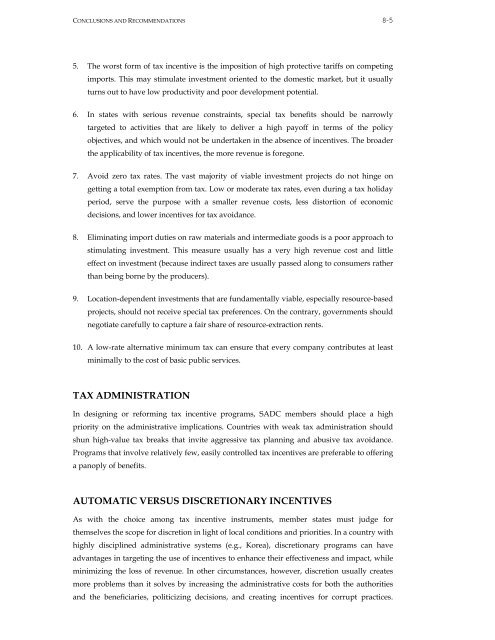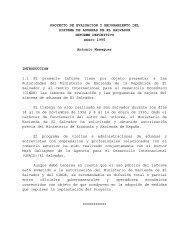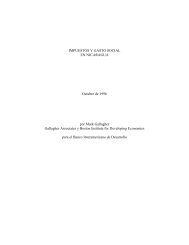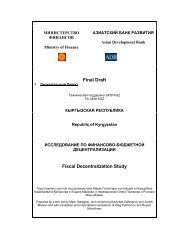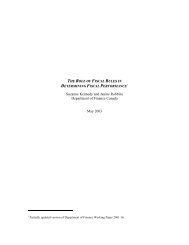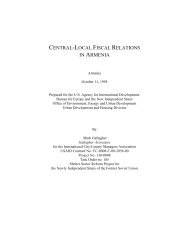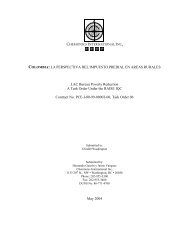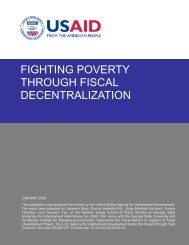Effectiveness and Economic Impact of Tax Incentives in the SADC ...
Effectiveness and Economic Impact of Tax Incentives in the SADC ...
Effectiveness and Economic Impact of Tax Incentives in the SADC ...
You also want an ePaper? Increase the reach of your titles
YUMPU automatically turns print PDFs into web optimized ePapers that Google loves.
CONCLUSIONS AND RECOMMENDATIONS 8-5<br />
5. The worst form <strong>of</strong> tax <strong>in</strong>centive is <strong>the</strong> imposition <strong>of</strong> high protective tariffs on compet<strong>in</strong>g<br />
imports. This may stimulate <strong>in</strong>vestment oriented to <strong>the</strong> domestic market, but it usually<br />
turns out to have low productivity <strong>and</strong> poor development potential.<br />
6. In states with serious revenue constra<strong>in</strong>ts, special tax benefits should be narrowly<br />
targeted to activities that are likely to deliver a high pay<strong>of</strong>f <strong>in</strong> terms <strong>of</strong> <strong>the</strong> policy<br />
objectives, <strong>and</strong> which would not be undertaken <strong>in</strong> <strong>the</strong> absence <strong>of</strong> <strong>in</strong>centives. The broader<br />
<strong>the</strong> applicability <strong>of</strong> tax <strong>in</strong>centives, <strong>the</strong> more revenue is foregone.<br />
7. Avoid zero tax rates. The vast majority <strong>of</strong> viable <strong>in</strong>vestment projects do not h<strong>in</strong>ge on<br />
gett<strong>in</strong>g a total exemption from tax. Low or moderate tax rates, even dur<strong>in</strong>g a tax holiday<br />
period, serve <strong>the</strong> purpose with a smaller revenue costs, less distortion <strong>of</strong> economic<br />
decisions, <strong>and</strong> lower <strong>in</strong>centives for tax avoidance.<br />
8. Elim<strong>in</strong>at<strong>in</strong>g import duties on raw materials <strong>and</strong> <strong>in</strong>termediate goods is a poor approach to<br />
stimulat<strong>in</strong>g <strong>in</strong>vestment. This measure usually has a very high revenue cost <strong>and</strong> little<br />
effect on <strong>in</strong>vestment (because <strong>in</strong>direct taxes are usually passed along to consumers ra<strong>the</strong>r<br />
than be<strong>in</strong>g borne by <strong>the</strong> producers).<br />
9. Location-dependent <strong>in</strong>vestments that are fundamentally viable, especially resource-based<br />
projects, should not receive special tax preferences. On <strong>the</strong> contrary, governments should<br />
negotiate carefully to capture a fair share <strong>of</strong> resource-extraction rents.<br />
10. A low-rate alternative m<strong>in</strong>imum tax can ensure that every company contributes at least<br />
m<strong>in</strong>imally to <strong>the</strong> cost <strong>of</strong> basic public services.<br />
TAX ADMINISTRATION<br />
In design<strong>in</strong>g or reform<strong>in</strong>g tax <strong>in</strong>centive programs, <strong>SADC</strong> members should place a high<br />
priority on <strong>the</strong> adm<strong>in</strong>istrative implications. Countries with weak tax adm<strong>in</strong>istration should<br />
shun high-value tax breaks that <strong>in</strong>vite aggressive tax plann<strong>in</strong>g <strong>and</strong> abusive tax avoidance.<br />
Programs that <strong>in</strong>volve relatively few, easily controlled tax <strong>in</strong>centives are preferable to <strong>of</strong>fer<strong>in</strong>g<br />
a panoply <strong>of</strong> benefits.<br />
AUTOMATIC VERSUS DISCRETIONARY INCENTIVES<br />
As with <strong>the</strong> choice among tax <strong>in</strong>centive <strong>in</strong>struments, member states must judge for<br />
<strong>the</strong>mselves <strong>the</strong> scope for discretion <strong>in</strong> light <strong>of</strong> local conditions <strong>and</strong> priorities. In a country with<br />
highly discipl<strong>in</strong>ed adm<strong>in</strong>istrative systems (e.g., Korea), discretionary programs can have<br />
advantages <strong>in</strong> target<strong>in</strong>g <strong>the</strong> use <strong>of</strong> <strong>in</strong>centives to enhance <strong>the</strong>ir effectiveness <strong>and</strong> impact, while<br />
m<strong>in</strong>imiz<strong>in</strong>g <strong>the</strong> loss <strong>of</strong> revenue. In o<strong>the</strong>r circumstances, however, discretion usually creates<br />
more problems than it solves by <strong>in</strong>creas<strong>in</strong>g <strong>the</strong> adm<strong>in</strong>istrative costs for both <strong>the</strong> authorities<br />
<strong>and</strong> <strong>the</strong> beneficiaries, politiciz<strong>in</strong>g decisions, <strong>and</strong> creat<strong>in</strong>g <strong>in</strong>centives for corrupt practices.


